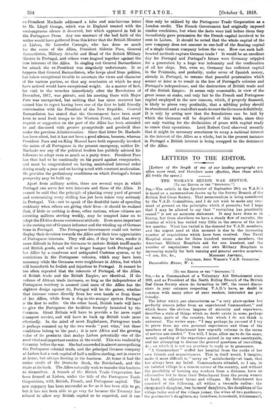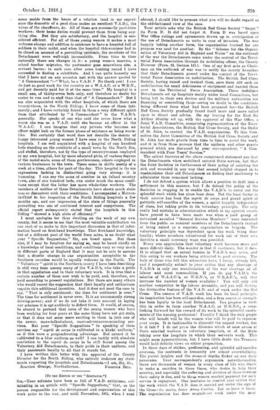[TO THE EDITOR OF THE " SPECTATOR.")
Sia,—As a Commandant of a Voluntary Aid Detachment since 1918, and as President of the North Riding Branch of the British Reel Cross Socieby since its formation in 1907, the recent discus- sions in your columns respecting V.A.D.'s have, no doubt in common with many other of your readers, interested -me pro- foundly.
The letter which you characterise as "a very plain-spoken but perfectly sincere jotter from an experienced Commandant," and which bears the obvious impress of sincerity and experience, describes a state of things which no doubt exists in some, perhaps in many, parts of the country, but which I do not think is universal. The writer says: "I may perhaps be excused if I try to prove from my own personal experiences and those of the members of my Detachment how urgently reforms in the terms of service are needed." You will, I hope, allow me to do the same, merely speaking of the experience gained in my own countryside, and not attempting to discuss the general questions of recruiting, he., on which it is not my province to reply or to pronounce.
" A Commandant" staffed her hospital from the ranks of her own friends and acquaintances. This in itself would, I imagine, make it more difficult to "carry on" satisfactorily—at least, that has always been my belief. Commandants situated, as I am, in an isolated village in a remote corner of the country, and without the possibility of housing any workers from a distance, have no alternative but to form their Detachment from the young women at hand, in adjacent farms and villages. My Detachment has consisted of the following, all within a two-mile radius : the elergyman's daughter, two farmers' daughters, the daughters of the village tailor and-of the village joiner, the wives of two gardeners, the postmaster's -daughters, my laundress, housemaid, kitoherunaid, seine- makis- from the house of a relation (and in my experi- ence the-domestic of a good elass makes an excellent V.A.D.), the wives of the chauffeurs, &c. All of these are neceeearily part-time workers: their home duties would prevent them from being any- thing else. But they are satisfactory, and the hospital is con- sidered efficient. For all of these young women it makes a most welcome change and addition to existence to have a hospital full of soldiers in their midst, and when the hospital this summer had to be closed on amount of a prevailing epidemic, the members of the Detachment were welt-nigh inconsolable. From time to time naturally there are changes in it: a young woman marries, a school teacher migrates, the postmaster goes somewhere else, a servant leaves : in each case after some hunting round I have succeeded in finding a substitute. And I can quite honestly say that I have not on any occasion met with, the answer quoted by " A Commandant "—" What, be a V.A.D.? No thank you! I can do suet as good work for the country as a W.A.A.C. or a W.R.N., and get decently paid for it at the same time." My hospital is a small one, of thirty-seven beds only, and therefore no doubt far easier to run and to staff than that of " A Commandant." But I am also acquainted with the other hospitals, of which there are twenty-three, in the North Riding; I know some of them inti- mately; and I have certainly found in them a very different spirit from that attributed by "A Commandant" to the V.A.D.'s generally. She speaks of one who said she never knew, what a worm she was as a V.A.D. until she became an officer in the W.A.A.C. I can imagine that any private who becomes an officer might look on the former phase of existence as being worm- like. But certainly that word does not describe the dozens of happy interested young women / have seen in the North Riding hospitals. I am well acquainted with a hospital of one hundred beds standing on the outskirts of a small town by the North Sea, and staffed, therefore, not By the type of countrywoman employed in my own hospital, but by more educated girls, of various degrees of the social scale, some of them gentlewomen, others employed in various businesses in -the town. These come in shifts mostly of a week at a time, others for part of the day. This hospital is (to use expressions lacking in distinction) going very strong: it is humming. I on say the same of another in an inland country town, also of one hundred beds, run under much the same condi- tions except that the latter has more whole-time workers. The members of neither of these Detachments have shown much stale- mess or discontent with their conditions. I accompanied a Matron- in-Chief in her inspection of the North Riding hospitals a few months ago, and our impression of the state of things generally prevailing was one of continued interest and competence. The official report subsequently stalled that the hoepitals in this Riding "showed a high state of efficiency."
I must apologize .for thus dwelling on the work of my own county, but it seems to me that the most valuable contribution we can each of us make to this important discussion is that of infor- mation based on first-hand knowledge. That first-hand knowledge, but of a different part of the world from mine, is no doubt what your "Specific Suggestions." Sir, are based upon. But these also if I may be forgiven for saying so, may be based chiefly on a knowledge of local conditions, and conditions vary so very much in different parts of England that it may not be safe to assume that a drastic change in *us organization acceptable to the Southern counties would be equally welcome in the North. The "Voluntary "spirit in the Northern county I have been describing is still very keen among many of the V.A.D.'s, who take a pride in that appellation and in their voluntary work. It is true that a certain number of them now wish to be paid, and, therefore, are paid according to present regulations. But there are many others who would resent the suggestion that their loyalty and enthusiasm require this additional incentive. And it does not meet the case to say, "That is only sentiment : the time for sentiment is over." The time for sentiment is never over. It is an uncommonly strong driving-power; and if we do not take it into account in laying our schemes it is apt suddenly to deflect them. It would, of course, be absurd to pretend that none of the young women who have been working for four years at the same thing have not got stale, or that it does not seem more exciting to them to join one of the newer, more-balked-about, more-adventurous-sounding ser- vices. But your "Specific Suggestions" in speaking of these services say "esprit de corps is cultivated in a khaki uniform," as if this were a preponderating advantage. But cannot it be cultivated in a blue uniform as well? I can testify with absolute conviction to the esprit de corps to be still found among the Voluntary Aid Detachments, to their pride in their uniform, and their passionate loyalty to all that it stands for.
I have written this letter with the approval of the County Director for the North Riding, who entirely endorses my state- ments respecting the hospitals and Detachments.—I am, Sir, de.,
Boonton Grange, Northallerton. Fur:arms BELL.



































 Previous page
Previous page